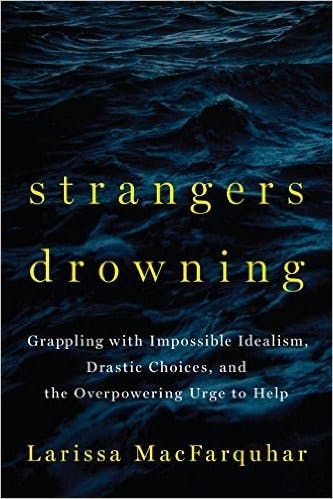On 21st Street, between L and K, there is a homeless man who sits perched atop his small pile of possessions, observing, with a kind of detached curiosity, Washington’s harried pedestrians. I pass him twice daily, and he’s become one of the fixtures of my walk. In the morning, he smokes his pipe, the fragrance of which hits me, still half-asleep, like a second alarm. In the evening, he tends to retreat into his tent, leaving one flap open to continue his observation of the street. He never begs for money or addresses the passersby, though he often talks to himself in Chinese. There is a small piece of cardboard next to him that reads (in English and in Chinese), “Man for himself.” At some point in the last few weeks, he seems to have acquired a cellphone. I passed him one evening snapping selfies in front of rush hour traffic.

When I met his gaze after some months of this daily walk-by, I realized that he recognized me. We were strangers, and we weren’t. Should I bring him something? An extra banana in the morning? I began to feel vaguely responsible, but I delayed getting involved: If I offered him something once, would that mean bringing something every day? Would he expect it when he saw me or would I feel guilty if I passed by empty-handed? More than anything, I realized I dreaded the righteous, self-satisfied feeling that comes with performing unsolicited acts of charity. I hated feeling good for doing something so infinitesimally small, for letting his suffering become a prop for my vanity. And no matter how I chastised myself, I knew, to some degree, that it would.
Giving is a morally and psychologically fraught undertaking. The platitude, “It’s in giving that we receive,” sounds fuzzy and sweet, but it also discloses something darker about the act: Giving is not self-denying but self-affirming, and sometimes even self-serving in a veiled, backhanded way that only increases its dubiousness. When the sociologist Marcel Mauss studied ancient societies, he discovered that giving without the expectation of return was considered aggressive: It set the giver up as superior to the recipient; it imposed the burden of gratitude without the relief of reciprocation. In some ancient languages, “gift” also meant “poison.”
If giving can be poisonous, what of the giver? Far from being universally embraced, do-gooders are often treated with skepticism and held at arm’s length. Consider how we ridicule the celebrity adoption trend or our scorn for Silicon Valley’s cloying ambition to “make the world a better place.” As Larissa MacFarquhar writes in her new book, Strangers Drowning: Grappling with Impossible Idealism, Drastic Choices, and the Overpowering Urge to Help, the term “do-gooder” is demeaning: It suggests someone annoyingly earnest and self-righteous, disliked perhaps because others detect his self-regard or perhaps because his upstanding existence is a reproach to theirs. Benjamin Franklin abandoned his quest for moral perfection when he recognized “that a perfect character might be attended with the inconvenience of being envied and hated; and that a benevolent man should allow a few faults in himself to keep his friends in countenance.”
But as MacFarquhar rightly notes, our “ambivalence toward do-gooders” is based on more than envy; it also arises out of a “deep uncertainty about how a person ought to live.” For do-gooders, the answer to this question looks clearer than it does to most of us, troublingly clear in fact: a good life is a life in which you maximize the amount of good you can do. That might mean donating money to help ten strangers, rather than spending the same amount of money on a new car for yourself, or more challengingly, rather than spending the same amount of money on critical medical treatment for one member of your own family. Or it might mean not visiting a sick relative in hospital, because the time would be better used earning money that could be donated to charitable causes that would help provide hundreds of people with vaccines for preventable illnesses.
The philosopher Peter Singer argued for this form of moral reasoning in his 1972 paper "Famine, Affluence, and Morality". MacFarquhar takes the title of her book from the following thought experiment in that paper: If you walk past a pond and see a child drowning, would you muddy your clothes to save it? Most people would. But if that child were dying in a pond one hundred miles away, or on the other side of the world, would you still be willing to forfeit a set of clothes or the equivalent amount of money, in order to save that child’s life? Children are dying all the time, and the money we spend on relatively inconsequential things (if anything that is not life-saving is deemed inconsequential) can buy food or medicine for people in need. By neglecting to relieve their suffering, he argues, we’re just as responsible for their deaths as if we had walked right by a child drowning in a pond. But then, how many lives are we obliged to save? How much do we owe to strangers and how much of our own pleasure should we forgo? The questions posed in Singer’s proposition never really fade from significance, but with the events of recent weeks—a drowned toddler on Europe’s shores, a pope decrying inequality and capitalism’s excess—they feel especially urgent.
MacFarquhar offers a study of goodness through profiles of extreme do-gooders: a man who chooses to live in poverty, for instance, cringing at buying so much as a soda when the money could be spent on food or medicine for a child in need; a couple that founds a leprosy colony to care for India’s neglected, exposing their own children to possible contamination in the process; another couple so compelled to make a difference, they end up adopting twenty children. These are people who take the pursuit of selflessness to the limit, who feel the suffering of strangers as a personal burden: “How could he relax and watch TV,” one man wonders, “when people were starving?”
Some of these people were directly influenced by Peter Singer’s argument; others recruited his ethics to lend philosophical rigor to their eccentric life choices. Their examples of service and charity are admirable. Indeed, there is something deeply compelling about people who live the ideal of selflessness fully, but their stories also point to the place where altruism becomes pathological, a kind of addiction. After all, if you truly believe that a moral life means helping those in need whenever possible, your work is never done. One man neglects to do the dishes (to his girlfriend’s frustration) because it’s valuable time that could be spent helping people instead. A young woman who has always wanted children is tortured by the recognition that a child will be an enormous expense and a drain on her charitable resources. These people are aid junkies, and though their choices seem alien and unimaginable to most of us, it’s not hard to understand how they got there. One woman hears in church “as if for the first time, that Jesus’s message was to resist violence and stand with the poor. She thought to herself in wonderment: It’s so easy—so simple. To her, standing with the poor meant being one of them.” She gives up her middle-class lifestyle and subsists on the bare minimum, donating the bulk of her salary to charity.
But even aid offered with the best intentions isn’t a uniformly pure undertaking. The couple hooked on adopting improves the lives of many ill and unwanted children—but they also sacrifice the needs of the children they already have, some of whom end up in jail. Humanitarian aid workers are a noble group—but studies have shown that their work can prolong conflicts, fuel the trade of weapons, damage local economies, and force farmers out of business, benefiting donors from the first world more than recipients in the third. Some aid workers become addicted to the adrenaline rush of saving lives, especially in a war zone. A Rwandan woman was appalled to learn, in the aftermath of genocide, that the Westerners were bored and yearning for action again: the suffering of others lent meaning, purpose, and glory to their lives.
There is a long history of resistance to altruism, of thinkers who see an extreme sense of duty as a masochistic need for self-punishment or a narcissistic pride in one’s ethical example. For Romantics like Friedrich Nietzsche or William Blake, for instance, the Christian ideal of self-denial was dangerous and suicidal, a repression of the instincts of nature. Anna Freud, the daughter of Sigmund Freud, who also practiced her father’s brand of psychoanalysis, diagnosed altruists as control freaks who, obstructed in their own wishes, pursue desire vicariously: “With altruism, you can fight for somebody else’s fulfillment of the wish with the same aggression, with the same energy.” Al-Anon, a recovery program founded in the 50’s for the friends and family of alcoholics, perpetuated the thinking that helping someone in the wrong way can be crippling for both the helper and the victim, binding them in a dynamic of codependency.
MacFarquhar’s narrative alternates beautifully between profiles of individual do-gooders and this history of ideas that undermine their work. She returns us to the age-old questions about how to live, not by thinking in philosophical abstractions or hypothetical scenarios but through the lived experience of real people—their psychology, influences, relationships, triumphs, and shortcomings: the messy place where ethics actually lives. Their stories throw our talk of “making a difference” and “changing the world” into sharp relief. Lots of people talk about changing the world, MacFarquhar writes, but that’s not what they mean: “They mean securing enough help so there is less avoidable suffering and people can get on with living decent lives; they don’t mean a world in which helping is the only life there is.” One wonders what would happen to do-gooders once there was no more suffering to relieve. What would they live for? Is there a value in living for them beyond the bare evasion of pain?
There is something almost childlike about the intensity and optimism with which do-gooders try to clean up the world. But is it an admirable preservation of the child’s idealism, a Wordsworthian closeness to that time when “heaven lies about us”? Or is it a naïve unwillingness to reckon with the realities of earthly existence? MacFarquhar’s book is a web of questions that gets more and more tangled. What do-gooders lack, she eventually concludes, is that “happy blindness that allows most people, most of the time, to shut their minds to what is unbearable.” Still, one wonders what MacFarquhar intends us to take from their example: Are they moral exemplars or cautionary tales? Their stories read too much like an ethical freak show to form a basis for normative judgment. In the end, one suspects that Aristotle had it right all along: All things in moderation, even kindness.
